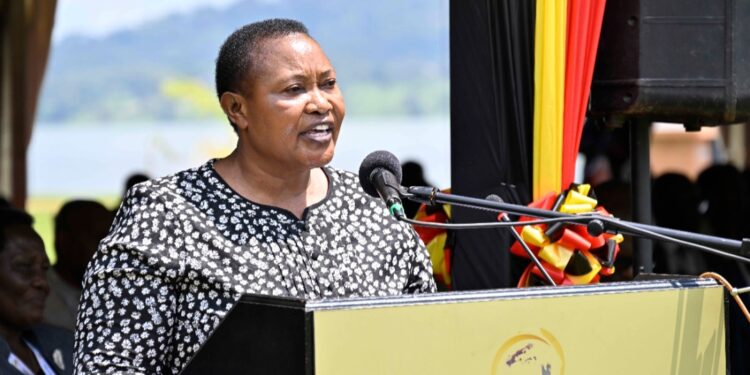
President Yoweri Museveni arrived in Kibuku district on November 10, 2024, as part of a performance evaluation tour for the Parish Development Model (PDM). After spending three days there, he would periodically travel to the sub-regions of Sebei, Teso, Karamoja, and Bugisu. In order to personally assess the state of PDM implementation on the ground, he is scheduled to go to different sub-regions of the nation.
I want to express my gratitude to His Excellency the President for his dedication to improving Ugandans’ lives and eradicating poverty in their homes. His travels are an expression of his belief in PDM’s capacity to improve and change Ugandans’ lives.
The President has already traveled to Greater Masaka, Acholi, and West Nile. We want to have him visit the Busoga Sub-Region soon, before moving on to other places. Every parish and ward in the nation has PDM, and the people there are ecstatic. The lives of the willing now demonstrate what began as a paper idea.
I want to express my gratitude to Ugandans for consistently greeting the President and implementing his advice on reducing poverty in your homes and communities. There is still much to be done. Every trip commemorates a new milestone. How well the general public accepts the message will determine the speed. Much work has been done to execute the PDM since the President introduced it in Kibuku district in 2022. Although regulations have been examined and updated as necessary, the ultimate goal is still to move 39% of the population from subsistence to the money economy.
At the supervisory and monitoring level, my ministry is active in PDM. The responsibility of overseeing the strategy’s execution to ensure that all participants carry out their duties without deviation falls on the Resident District Commissioners (RDCs), Resident City Commissioners (RCCs), their deputies, and their assistants. They are responsible for making sure that the beneficiaries are chosen fairly and transparently, that the people who enroll them do not demand money from them, and that those who misuse PDM funds face consequences. Other tasks are applicable based on the detected issue. We are able to evaluate and ascertain the implementation’s progress, obstacles, and future directions based on the reports and our own fieldwork.
On PDM, the President receives more updates than anyone else. He has intelligence briefs, excerpts from the public press, and other sources in addition to the implementing line ministry’s (Local Government) briefs. The purpose of his field visits is to provide him with a hands-on evaluation of the information he is briefed on, to personally encourage the beneficiaries, and to remind government representatives to perform better and address public complaints.
Additionally, he solicits public input, comprehends the real-world difficulties that the government’s anti-poverty initiatives face, and suggests changes or enhancements based on the type of difficulties found.
Most generous has been the President. He is especially sensitive of the average citizen, or omuntu wa wansi. Beneficiaries were initially permitted to receive less than one million shillings under the PDM regulations. Many of the original beneficiaries received that, and I’ve heard that some parish chiefs and members of the PDM committee took advantage of the situation to deceitfully negotiate the amount of their payments with unsuspecting potential beneficiaries. The “victims” of extortion may receive more money if they agreed to pay a particular amount, after which they could give it back to the official.
However, other claimants sought for less money, say Shs300,000, even in the absence of the extortion. Although it was something, this sum was insufficient to start someone off or grow their business. What might such a sum alter? The President ordered that all beneficiaries get Shs1 million in light of these concerns. He recently ordered that the government cover all bank fees in order to provide the beneficiary the full one million dollars. For someone just starting off, this sum is reasonable. If it is less, it may prove inadequate and make repayment difficult; if it is more, it may lure the recipient and be wasted. However, there is a good likelihood that the government will raise the seed cash for each beneficiary if they make wise investments and pay them back.
Government officials have received warnings from the president to stop engaging in extortion in PDM. Everyone involved will be prosecuted and made to return the money. Once more, the goal is to guarantee that the beneficiaries receive the entire amount for which they are responsible when pay time arrives, which is quickly approaching.
Beneficiaries were initially expected to begin repaying funds to their individual SACCO accounts on schedules determined by the enterprise’s maturity. On their behalf, the President, however, ordered them to reimburse after two years (24 months) with a one-year (12-month) grace period. This indicates that it’s time for someone who received funding in early 2023 to begin repaying, with a grace period stretching to next year.
I have no doubt that the one million shillings spent has been able to “reproduce” for someone whose business allows them to harvest twice or three times a year, making payback a simple process. In order for the funds to benefit their neighbors and family members in the parishes or wards, I kindly ask our cherished beneficiaries to fulfill their end of the agreement. It is a revolving fund that remains in the SACCO account, which functions as a kind of “village bank.”
It is impossible for someone like Ms. Florence Nabutono of Bukoda Cell, Kasasira Town Council in Kibuku District, whose prosperous poultry and pig farming business was one of those the President visited, to struggle to repay. They serve as role models for their fellows. I ask for RDCs and RCCs to utilise such successful beneficiaries to mobilise their colleagues, as a follow-up to the President’s visits.
With the exception of the Secretariat under the Ministry of Local Government, which is headed by my colleague Hon. Raphael Magyezi, I would like to congratulate all parties involved in the execution of PDM for their constructive contributions to its success. Let’s address the shortcomings and make sure the plan significantly improves the lives of our citizens regardless of their political affiliation. In this manner, the National Resistance Movement’s (NRM) vow in its manifesto to create jobs and improve Ugandans’ socioeconomic situation will be entirely fulfilled.
I implore district and city leaders to prepare truthful reports on PDM progress thus far in order to set the stage for the President’s tours.



